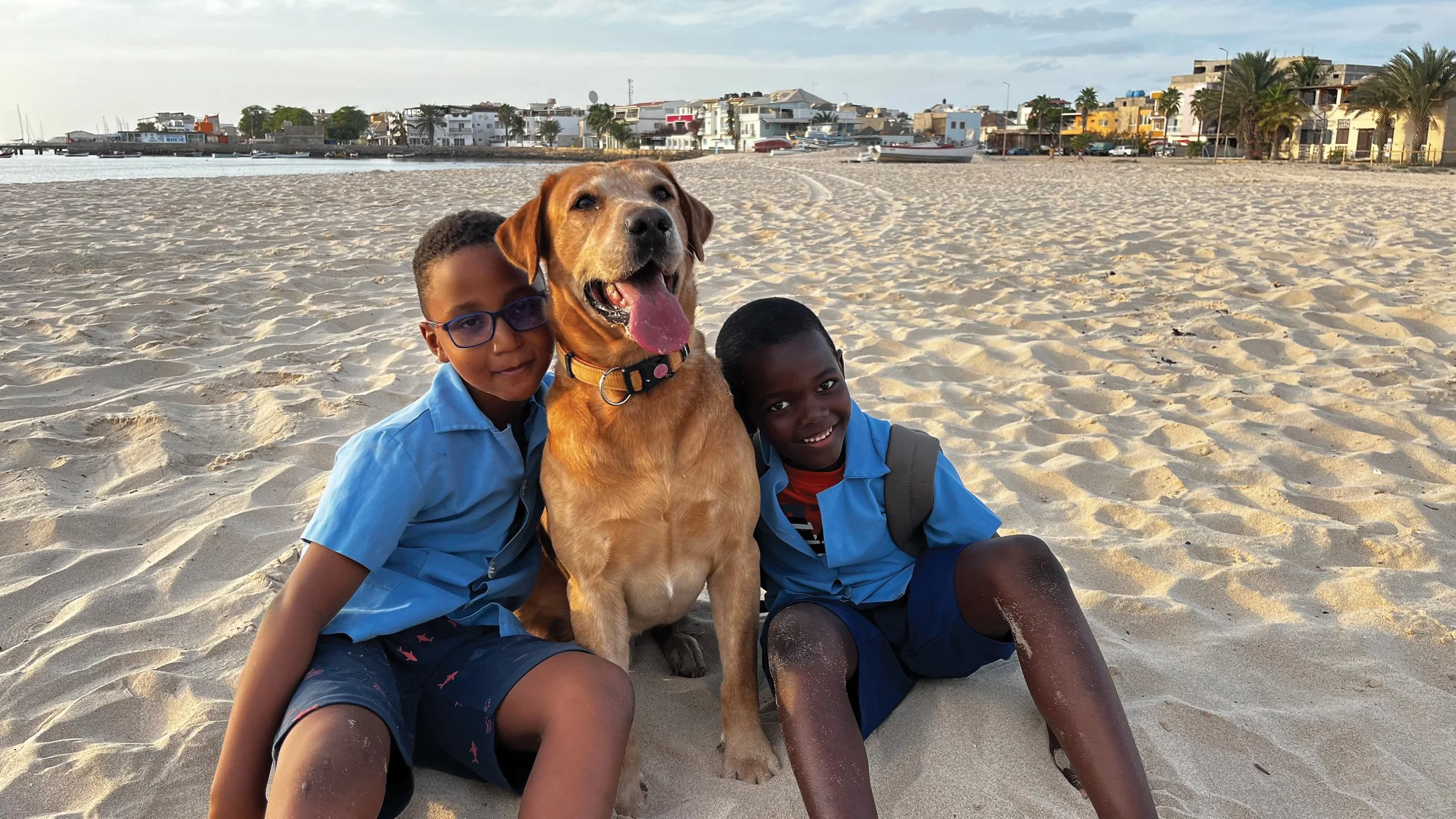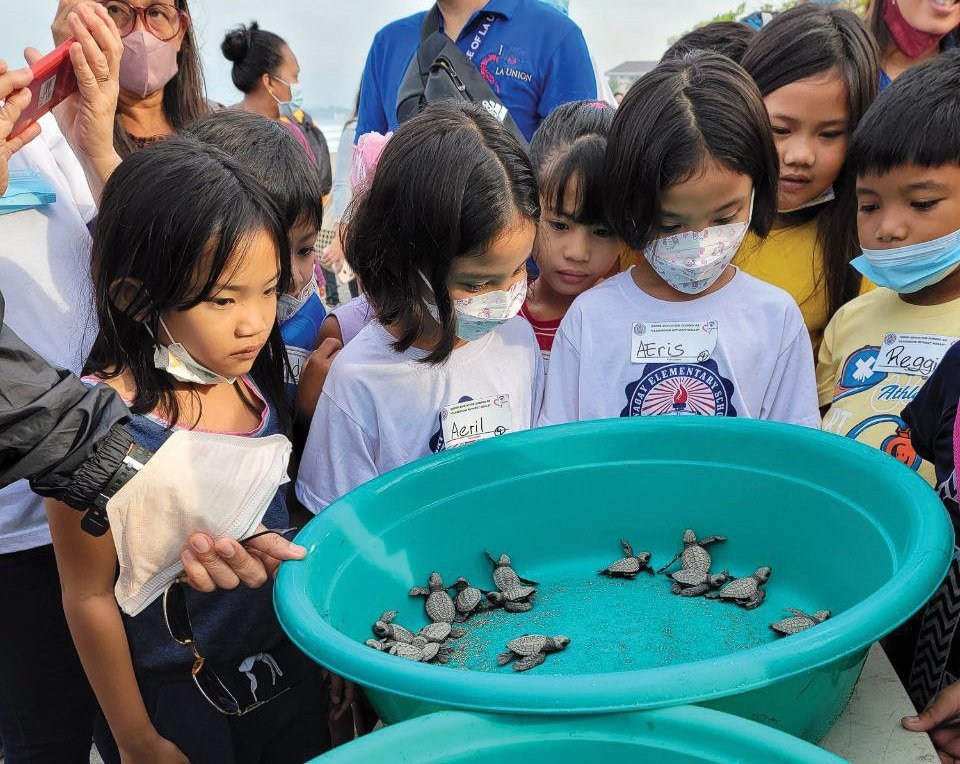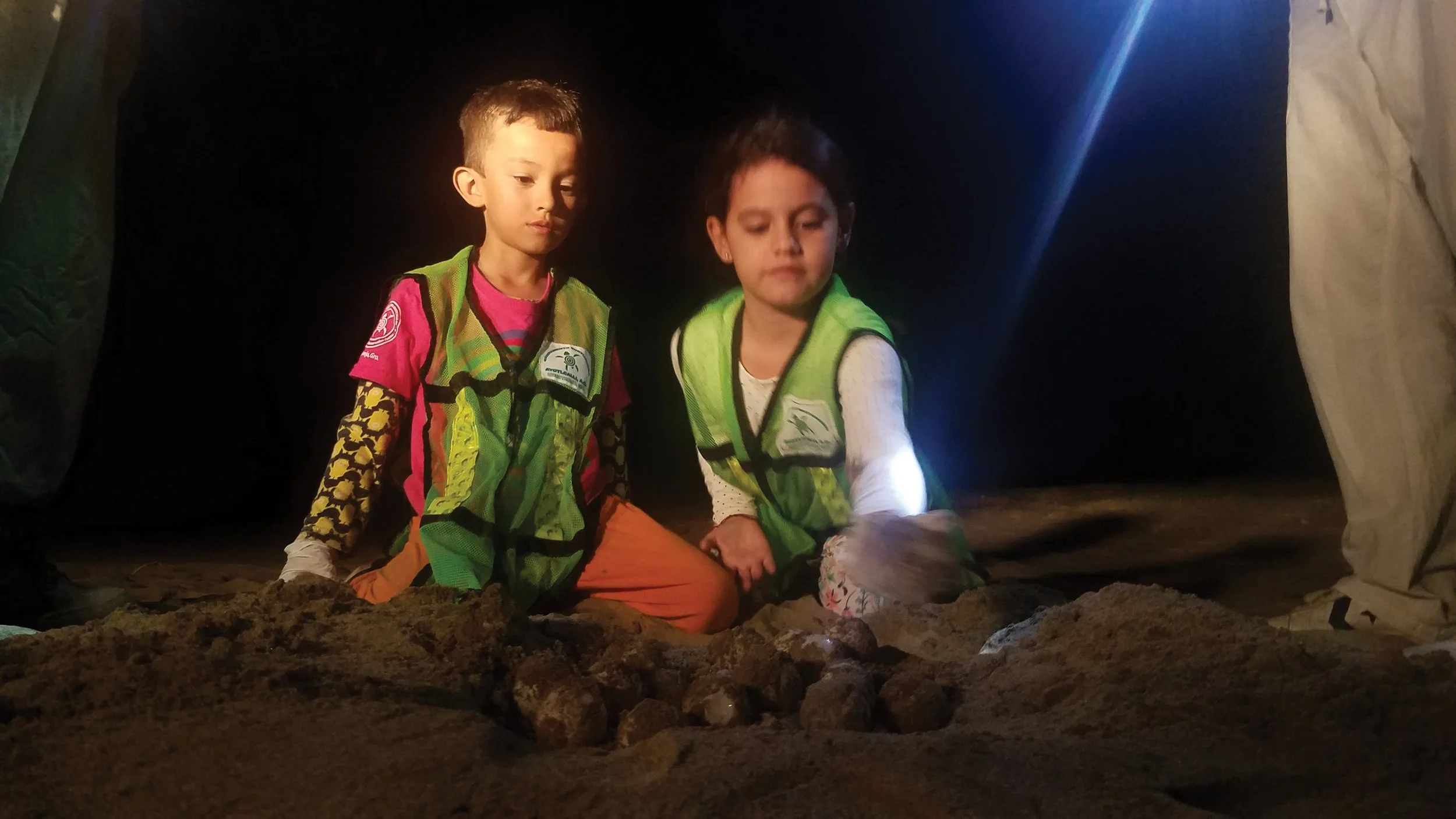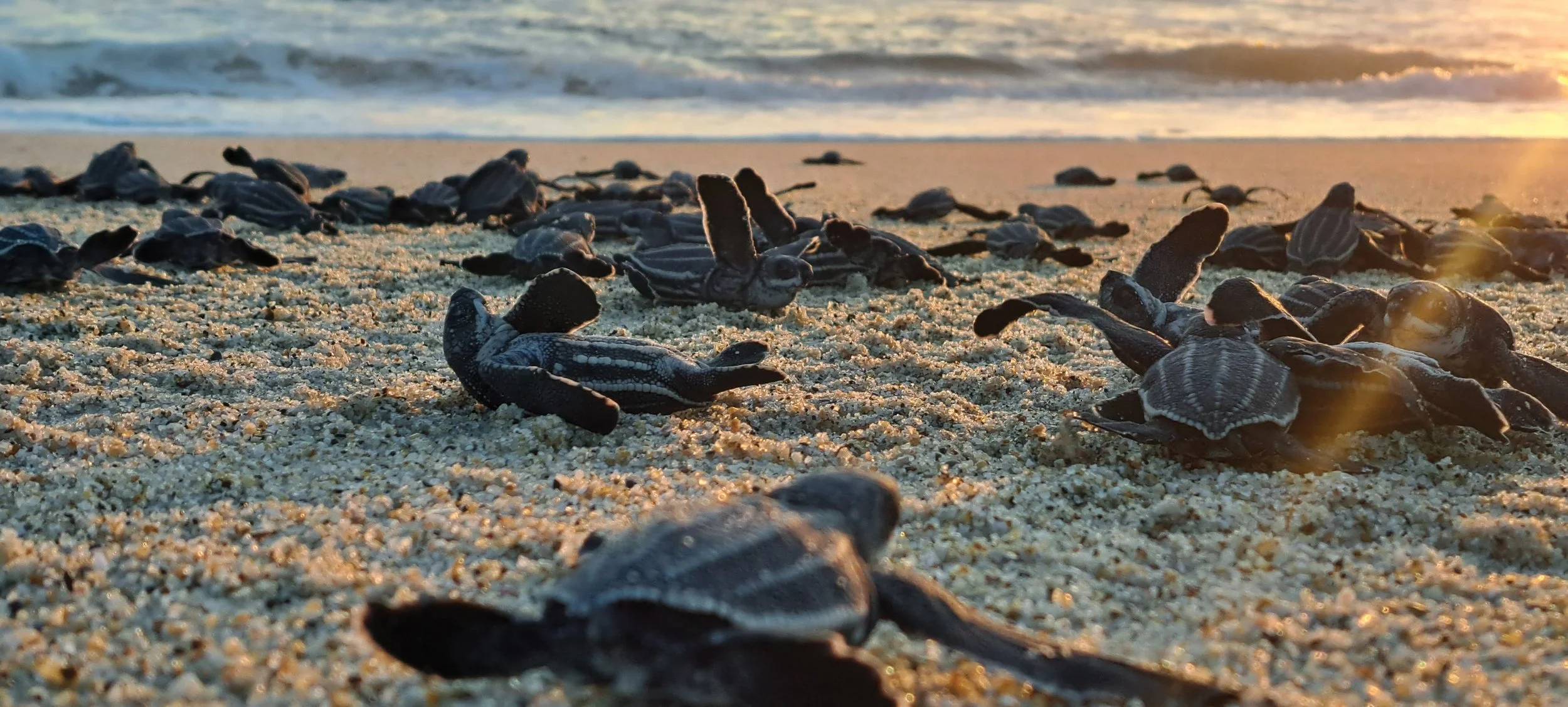Acting Globally: SWOT Small Grants 2023
Since 2006, SWOT’s small grants have helped field-based partners around the world to realize an array of important research and conservation goals. Fully 160 grants have now been awarded to 125 applicants in more than 57 countries and territories for work addressing three key themes: (1) networking and capacity building, (2) science, and (3) education and outreach. The following are overviews of SWOT’s 2023 grantees. Visit our grants page for application instructions and a list of all past SWOT grantees.
Sea turtle patrol dog Kilo has many fans! He not only protects nesting turtles but also raises awareness in the community. © Fundação Tartaruga
CURMA—Philippines
The CURMA (Coastal Underwater Research Management Actions) Reef Experience Program will educate children and community members about plastic pollution mitigation and sea turtle conservation. Participants will strengthen their connection to nature through beach cleanups and activities to maintain sea turtle hatcheries.
Fundação Tartaruga—Cabo Verde
Fundação Tartaruga staff members will bring one of their beach patrol protection dogs, Kelo, to local schools in Boa Vista to raise awareness and inspire children to care for nature by protecting sea turtles, rather than consuming or selling turtle products, and by reducing and recycling plastic waste.
© SifCARE
Sea Sense—Tanzania
Sea Sense will expand its current conservation and research programs by training groups of community conservation officers in techniques for better understanding, monitoring, and protecting sea turtle foraging habitats and ensuring safe connectivity to nesting beaches.
Tetepare Descendants’ Association (TDA)—Solomon Islands
By providing necessary field equipment and training to its rangers, TDA will strengthen its sea turtle nesting beach monitoring program, which protects animals and gathers valuable conservation data in partnership with local and international partners.
Anambas Foundation—Indonesia
By combining socioecological research and community engagement, Anambas Foundation aims to encourage local involvement in sea turtle conservation and tourism in the Anambas Islands Marine Protected Area.
© Tetepare Descendants’ Association
Safe Earth Foundation (SEF)—Nigeria
SEF will hold a workshop for artisanal fishers and law enforcement agencies to strengthen local participation in marine conservation and bycatch data collection and to encourage more proactive and efficient enforcement of illegal take laws.
National Center for Environmental Research (CNRE)—Madagascar
CNRE will conduct a field-based assessment in the Besalampy District, a coastal region in northwestern Madagascar, to fill data gaps on nesting sea turtles that will allow researchers to estimate populations, create an inventory of nesting sites, understand habitat use, and build a conservation strategy.
AZA-SAFE GRANT RECIPIENTS
Since 2019, SWOT has partnered with the Association of Zoos and Aquariums (AZA) and its Sea Turtle SAFE (Saving Animals from Extinction) program to make several annual grants for projects related to the conservation of two of the top global priorities for sea turtle conservation—eastern Pacific leatherbacks and Kemp’s ridley turtles.
© Sea Turtle, Inc.
Sea Turtle, Inc.—U.S.A.
Through Sea Turtle, Inc.’s STEM (science, technology, engineering, and mathematics) summer camp, teenagers will study ocean conservation through water-quality measurement, marine species identification, and field trips to document microplastics. Participants will advance their scientific literacy and learn how to help oceans and Kemp’s ridleys.
Centro ECOMAR (Centro de Investigación, Protección y Conservación de la Tortuga Marina)–UAgro (Universidad Autónoma de Guerrero)—Mexico
Centro ECOMAR–UAGro will teach students and fishers from Guerrero, Mexico, about sea turtles, including eastern Pacific leatherbacks, and teach them how to diminish fishery bycatch and behave in ways that positively affect sea turtles and the ocean.
Campamento Tortuguero Ayotlcalli—Mexico
Campamento Tortuguero Ayotlcalli will lead an outreach and education campaign, Warriors of the Rainbow, aimed at school-age children, community members, fishers, and service providers, to keep eastern Pacific leatherbacks and their habitats safe.
© Campamento Tortuguero Ayotlcalli A.C.
Kuemar—Costa Rica
Kuemar will conduct educational talks for tourists and operators at three important eastern Pacific leatherback sites. The project aims to reduce disturbances to nesting females and raise awareness about the consequences of improper waste disposal.
South Carolina Department of Natural Resources (SCDNR)—U.S.A.
SCDNR will post bilingual signs at coastal piers in South Carolina with the National Oceanic and Atmospheric Administration’s “Recommendations to Reduce Injuries if You Hook or Entangle a Sea Turtle.” The signs will include stranding hotline information to ensure the rescue of injured and cold-stunned Kemp’s ridleys.
JUSTSEA Foundation—Colombia
By providing portside training, workshops, and presentations to anglers and fishing cooperatives, JUSTSEA hopes to reduce leatherback bycatch, foster collaboration, and promote sustainable fishing practices that reduce sea turtle impacts.
© Campamento Tortuguero Ayotlcalli A.C.
Universidad Michoacana de San Nicolás de Hidalgo—Mexico
University faculty from Universidad Michoacana de San Nicolás de Hidalgo and students will conduct research at Mexiquillo, a historically important nesting beach for eastern Pacific leatherbacks, that will determine the sex ratio of hatchery nests and help to inform conservation efforts for that rookery.
Elizabeth Labastida-Estrada—Mexico
For the first time, viral sequences of ChHV5, the virus that causes fibropapillomatosis, will be obtained from Kemp’s ridley turtles in Rancho Nuevo for researchers to determine whether there are genetic variations that distinguish the Kemp’s ridley viral strain from that found in other sea turtle species.
César Paúl Ley-Quiñónez—Mexico
Toxic pollutants are a poorly known threat to Kemp’s ridley turtles. This research will quantify the concentrations of trace elements in the blood of nesting Kemp’s ridleys at Rancho Nuevo to determine potential threats to population health.
© Mildred Alpizar Quezada
Mildred Alpizar Quezada—Mexico
Mildred Alpizar Quezada’s research will evaluate the concentration of trace metals in dead leatherback hatchlings found at Playa Tierra Colorada, one of the main nesting beaches for eastern Pacific leatherbacks in Mexico.
GroBios—Mexico
GroBios A.C. is creating standard protocols for projects in Guerrero to conserve eastern Pacific leatherbacks and their habitats. The nonprofit conducts training and provides institutional strengthening support to fill data and protection gaps throughout the state.
Gladys Porter Zoo—Mexico
The Gladys Porter Zoo (Brownsville, Texas, U.S.A.) will initiate a PIT (passive integrated transponder) tagging program at Altamira and Miramar, two important satellite nesting beaches for Kemp’s ridleys near Rancho Nuevo, as part of the Mexico–U.S. Binational Kemp’s Ridley Recovery Program.
This article originally appeared in SWOT Report, vol. 19 (2024). Download this article as a PDF.







